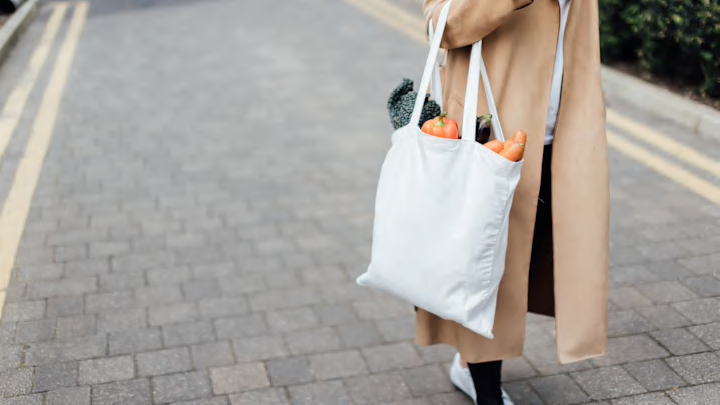Many people looking to live a more sustainable lifestyle have switched to reusable grocery bags. Rather than taking home single-use plastics and sending them to a landfill every time they buy food, they rely on a handful of totes that last them for years. This practice sounds better for the environment in theory, but the sustainability of reusable bags versus plastic ones is more complicated than you might assume.
Like plastic grocery bags, reusable bags require fossils fuels to manufacture. As CNN reports, the carbon footprint of reusable totes actually outsizes their disposable counterparts many times over. In fact, according to an estimate from Denmark’s Environmental Protection Agency [PDF], a cotton bag needs to be used at least 7100 times to offset the environmental impact of its production. Even if you took your bags to the store every day, it would still take you nearly two decades to reach that mark. Reusable bags made from durable plastic materials like nonwoven polypropylene have a smaller carbon footprint, and only need to be used around 37 times before the purchase pays off.
Carbon emissions that contribute to climate change aren't the only factor to consider when judging a product's ecofriendliness. Cotton is biodegradable and breaks down after a few months, while single-use plastic bags may take centuries to decompose. During that time, they pose a threat to the ecosystems around them [PDF].
So which bag is better for the environment: cotton or plastic? The answer is whichever one you have at home. Many people already keep a collection of free totes they’ve accumulated in the back of their closest, and using them for groceries instead of buying new bags is the most sustainable option. If you don’t own any reusable bags, you could instead save your disposable grocery bags and bring them back to the store to reuse on your next visit.
Sustainable living isn’t necessarily about buying the right products—it’s about getting the most use out of what you already own. Here are more tips for being gentler on the environment in your everyday life.
[h/t CNN]
